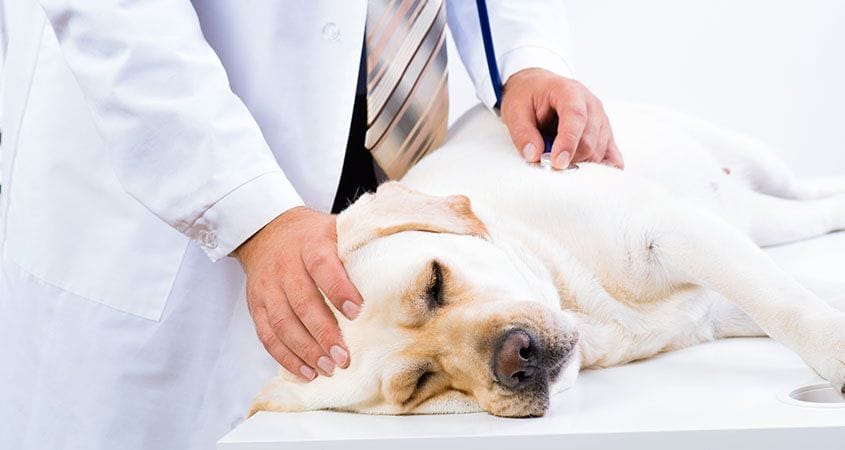Dear Dr. Weaver,
We adopted two pups from our local shelter, had them for three days, and ended up having them put down because of parvo. They apparently had the virus when we adopted them.
We weren’t told they were exposed or possibly had the virus. Very disheartening.
We truly want pups, but don’t know how long we have to wait before we can adopt. We cleaned the indoors thoroughly (steam cleaned the entire house) and have a nice, clean yard. Please let us know. We are ready to raise another family. Our kids are grown and gone. We have lots of love and time for raising pups.
Patty Torres
Hesperia, CA
Dr. Weaver Responds
Dear Patty,
I am so sorry to hear that you had to experience this devastating disease. Unfortunately, the virus that causes parvovirus can live in an environment for years. You can decrease the virus in the environment by using a 1 to 10 dilution of bleach to water, but I never feel comfortable that you can eliminate the virus.
The good news is that the vaccine for parvo is highly effective. If your home has been exposed to parvo, I typically feel comfortable bringing a puppy in two weeks after they have had their fifteen-week vaccine, which is usually the third booster.

What is Parvovirus?
Canine parvovirus is a virus in puppies and can be spread through direct contact with an infected dog or indirectly by contact with a contaminated object. If your dog sniffs, licks, or eats infected feces, they are exposed to the deadly virus. Indirect transmission of infection to puppies can occur when they are exposed to contaminated objects such as:
- Food or water bowls
- Collars
- Leashes
- Hands or clothing of persons handling infected dogs
The infection primarily affects the stomach, causing considerable damage. The parvovirus can also infect the small intestine, destroying cells and impairing absorption while disrupting the gut barrier. Additionally, puppies with parvo can experience bone marrow and lymphopoietic tissue damage, and it may also affect the heart in more severe cases.
Why Puppies Get Parvovirus
Puppies between six weeks and six months are most vulnerable to the disease. Vaccinations are available to pups at 6, 8, and 12 weeks of age, and they will need to receive all three vaccinations to be fully protected against the virus. During that time, pet owners must be extra vigilant to keep their new puppy away from contamination.
Breeds at Risk for Parvovirus
All breeds can contract parvovirus, so getting your pup vaccinated is important. However, some breeds are at a higher risk for parvovirus, including:
- Labrador Retrievers
- Doberman Pinschers
- English Springer Spaniels
- Rottweilers
- German Shepherds
- American Staffordshire Terriers
Symptoms of Parvovirus in Puppies
Because parvovirus is most common among young puppies, anytime you notice your pup isn’t feeling well, it’s best to contact your veterinarian. If you suspect your furry friend has the virus, please get in touch with the vet immediately.
Also, let them know that it could be parvo so they can take the appropriate measures and guidelines to protect other animals in their office from getting infected.
It is essential to be aware of the symptoms associated with parvovirus, which include:
- Weakness
- Lethargy
- Depression
- Bloody diarrhea
- Fever
- Dehydration
- Loss of appetite
- Weight loss
- Vomiting
Prevention of Parvovirus in Puppies
Parvovirus is avoidable. Dogs and puppies should receive their vaccinations. Breeding dogs must get the vaccine as the pups depend on their momma’s antibodies during their first few weeks of life.
Puppies must only be exposed to unvaccinated dogs once they have had all their parvo shots. Ensure all dogs you have in your home are vaccinated, and take caution when introducing your puppy to other animals. Consider the places of socialization you visit with your puppy. Dog parks are a possible source of parvo, and until your dog is fully vaccinated, choose a less crowded option.
A precaution you can take in your home is to use a disinfectant specifically made to fight against parvovirus germs. This easy-to-use spray can be used on multiple surfaces and is safe to use around your favorite pets.
Treatment Options for Parvovirus-Infected Puppies
Your vet will diagnose parvo using clinical signs and blood work. An ELISA test can also be done to search for virus antigens in your dog’s feces. Additional testing may also be performed if necessary.
At this time, there is no cure for parvovirus. Your pet care provider will treat symptoms so your furry friend is comfortable. The recovery time for puppies with parvo is about one week, and the first three to four days are critical to successful improvement.

How to Cope With Having a Sick Puppy with Parvovirus
A highly contagious and deadly virus like parvovirus can wreak havoc on a home if precautions are not taken to prevent the spread. Pet owners must be vigilant and follow these tips if their puppy receives a parvo diagnosis.
Confine Your Dog
You will want to move your puppy to an area of the home that is easy to clean and away from other pets. This is particularly important if there are other puppies in the house because the virus can spread like wildfire.
Pay Attention to Symptoms
Some of the most common symptoms of parvo were shared above. Keep a close eye on your pup and share with your veterinarian if conditions worsen or continue on for too long.
Follow Treatment Plan
Once your pet care provider has laid out a treatment plan, make sure that you follow those instructions and do not give any medicine without their approval.
Disinfect & Clean Your Home
Parvovirus can live in the environment for months, so it’s essential to keep your home and yard clean and disinfected to prevent the spread of the virus. Use a bleach solution to clean all surfaces and toys, and avoid taking your puppy to areas where other dogs have been until they are fully recovered.
Provide Supportive Care
Puppies with parvo often have a decreased appetite, but it’s crucial to provide them with nutritious food to help support their immune system and aid in recovery. Offer small, frequent meals of easily digestible foods, such as boiled chicken and rice, or a prescription diet recommended by your veterinarian.
Parvovirus can cause severe dehydration in puppies, so it’s essential to keep them hydrated by providing plenty of fresh water.
Be Patient
Patience is vital when dealing with parvovirus in your puppy. This highly contagious disease can devastate young dogs, but most puppies can recover with proper treatment and care. It is important to remember that recovery can take time, and patience is necessary. It is essential to stay positive and supportive during this time, even when progress seems slow. With patience and care, your puppy can fully recover and return to a happy, healthy life.
Risks and Long-Term Consequences of Leaving a Puppy
Leaving a puppy unvaccinated against parvovirus can have serious long-term consequences. Parvovirus is a highly contagious viral disease that can cause severe gastrointestinal symptoms, such as vomiting and diarrhea, and can lead to dehydration, sepsis, and even death. Puppies are particularly vulnerable to parvovirus, and if left unvaccinated, they can become infected and suffer from long-term health problems, such as chronic diarrhea and weakened immune systems. Additionally, unvaccinated puppies can spread the virus to other dogs, leading to outbreaks in the community. It is crucial to vaccinate puppies against parvovirus to protect their health and prevent the spread of the disease.











